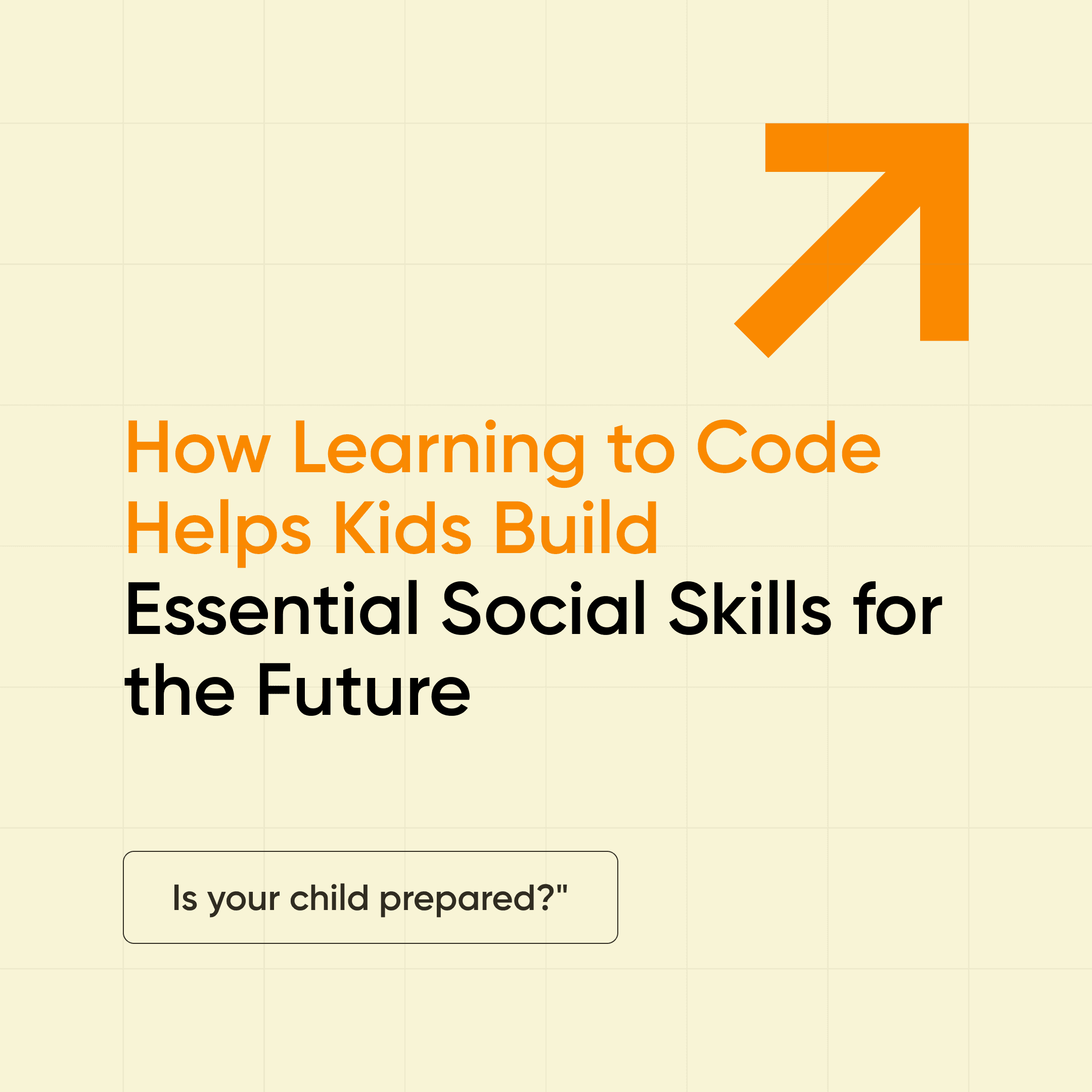How Learning to Code Helps Kids Build Essential Social Skills for the Future
Nov 29, 2024
In a world where technology is shaping nearly every aspect of our daily lives, coding has become more than just a valuable technical skill—it’s a powerful tool for developing social skills that will be crucial for kids as they grow into the leaders, collaborators, and innovators of tomorrow. While coding may initially seem like an individual pursuit, it actually encourages teamwork, communication, problem-solving, and empathy—skills that are vital in today’s interconnected world.
Let’s explore how learning to code can help kids build essential social skills for their future.
1. Collaboration and Teamwork
One of the greatest misconceptions about coding is that it’s a solitary activity. In reality, coding often involves working in teams, whether in school projects, coding camps, or hackathons. Kids who learn to code quickly realize they must collaborate with others to solve problems, write effective code, and debug errors.
Working in teams teaches kids how to:
Share ideas: Coding involves brainstorming and collaborating on the best possible solutions. Kids learn how to listen to others’ ideas and share their own.
Compromise: Code doesn’t always work on the first try. Kids need to be open to making changes and adjusting their approach based on feedback from teammates.
Delegate tasks: Team members often split the work when building a project together. This teaches kids how to delegate tasks based on each person’s strengths and how to hold themselves accountable.
These collaborative experiences provide a foundation for future professional teamwork, where cooperation, conflict resolution, and mutual respect are key to success.
2. Communication Skills
Coding isn’t just about writing lines of code—it's about communicating clearly. Kids need to explain their thought process when discussing code with others, whether it’s a classmate, a teacher, or a mentor. This helps kids develop the ability to articulate their ideas in a logical and structured way.
Additionally, coding teaches kids how to:
Explain complex ideas simply: Whether they are teaching someone else to code or explaining their own work, kids learn to break down complex technical problems into digestible explanations.
Ask for help: In coding, errors and bugs are inevitable. Asking for help or seeking advice from others is a critical social skill. It encourages humility and fosters a growth mindset.
Give and receive constructive feedback: Coding projects often involve reviewing others’ work. Giving constructive criticism, while being open to feedback, is an important skill that fosters personal and team growth.
Strong communication skills are not only crucial in the tech world but also in every professional field, where clear, concise, and respectful communication is a key to success.
3. Problem-Solving and Critical Thinking
At its core, coding is about solving problems. When kids write code, they encounter challenges that require logical thinking, creativity, and persistence to overcome. This process nurtures essential problem-solving and critical thinking skills that are transferable to many areas of life.
Moreover, kids often work together to solve coding problems, which teaches them how to:
Work through challenges together: Kids learn that setbacks are normal, and solving a problem often involves working with others to brainstorm new ideas or find alternative solutions.
Adapt and pivot: In coding, the first solution isn’t always the best one. Kids develop the ability to adjust and pivot when things don’t work as expected, an important skill in the dynamic world of work.
Persevere through failure: Debugging can be frustrating, but learning to persist in the face of failure builds resilience and teaches kids the importance of perseverance.
These skills are not only valuable in coding but are essential for handling challenges in both personal and professional life.
4. Empathy and Perspective-Taking
Although coding may seem like a technical endeavor, it also requires empathy—especially when kids create projects that are intended for others to use. Whether it’s designing an app, a game, or a website, coding encourages kids to think about the user experience. They must put themselves in the shoes of the user to understand how to make their project intuitive, accessible, and enjoyable.
Through coding, kids learn:
To consider other perspectives: Designing user-friendly interfaces requires thinking about different user needs, preferences, and abilities. This teaches kids empathy as they consider how to create something that benefits others.
To collaborate respectfully: In group coding projects, understanding and valuing others' ideas and perspectives is key to successful collaboration.
To adapt to diverse audiences: Coding also teaches flexibility, as kids learn to cater to different user bases, age groups, or cultural contexts when designing apps or games.
By considering others’ needs, kids develop an empathetic mindset that will serve them well in all aspects of life, from relationships to leadership.
5. Confidence and Independence
Finally, coding helps build confidence. When kids solve problems, write functioning code, or build something from scratch, they gain a sense of accomplishment that boosts their self-esteem. This newfound confidence in their abilities often carries over into other areas of life, giving them the courage to take on new challenges and push their boundaries.
Learning to code also encourages independence. Kids begin to realize that they are capable of finding solutions on their own, even when they face obstacles. This sense of autonomy and self-reliance is empowering and prepares them for future opportunities, both in the tech world and beyond.
Conclusion
Coding is much more than just a technical skill—it’s a powerful tool for developing social skills that will help kids thrive in the future. From collaboration and communication to empathy and problem-solving, the benefits of coding extend far beyond the computer screen. As kids continue to build these essential social skills, they are not just preparing for a future in technology—they’re preparing to be effective, confident, and empathetic members of society.
Incorporating coding into education is more than just preparing kids for future job markets—it’s about giving them the tools they need to succeed in a rapidly changing world. Whether they become software engineers, entrepreneurs, or community leaders, the social skills nurtured through coding will serve them throughout their lives.
So, the next time you think about enrolling your child in a coding class or after-school program, remember—it’s not just about learning how to write code. It’s about empowering kids with the social skills they’ll need to create, collaborate, and lead in the future.
More blogs







